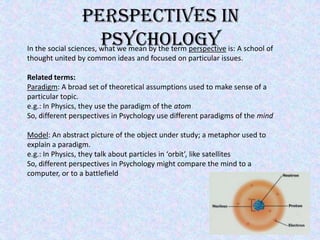
02 Perspectives in psychology
- 1. Perspectives In Psychology In the social sciences, what we mean by the term perspective is: A school of thought united by common ideas and focused on particular issues. Related terms: Paradigm: A broad set of theoretical assumptions used to make sense of a particular topic. e.g.: In Physics, they use the paradigm of the atom So, different perspectives in Psychology use different paradigms of the mind Model: An abstract picture of the object under study; a metaphor used to explain a paradigm. e.g.: In Physics, they talk about particles in ‘orbit’, like satellites So, different perspectives in Psychology might compare the mind to a computer, or to a battlefield
- 2. Five Key Perspectives Psychodynamic Behaviourist Cognitive Biological Humanistic
- 3. Psychodynamic The Psychodynamic perspective derives from the work of Sigmund Freud and his students and followers. The Psychodynamic perspective is defined by its concept of the unconscious, the part of the mind that contains hidden desires and motivating forces. The main method of investigation in the Psychodynamic perspective in psychoanalysis, which attempts to uncover the unconscious elements that affect a person. E.g.: through the analysis of a person’s dreams. So, in Psychodynamic perspective, the model of the mind is as an iceberg, with only the tip (the conscious mind) visible. An appropriate paradigm would be to say the mind is like a battlefield, with different parts of the mind fighting for control.
- 4. Behaviourist Behaviourism focuses on overt behaviour, and how a person’s behaviour is shaped by past experiences. Key thinkers include Pavlov, Watson & Skinner. All three conducted key experiments. Behaviourists do not consider the internal working of the ‘mind’, they only focus on explicit behaviour as that is the only evidence about a person that is empirical. To find empirical evidence, they conduct laboratory studies. While behaviorism eventually lost its hold on psychology, the basic principles of behavioral psychology are still widely in use today. Therapeutic techniques such as ‘behaviour modification’ and ‘token economies’ are often utilized to help children learn new skills, while ‘conditioning’ is used in many situations ranging from parenting to education.
- 5. Cognitive The Cognitive perspective explores mental processes such as sensation and perception, memory, intelligence, language, thought, and problem solving. It was influenced by concepts in computer science. Particular issues include the process by which information is processed, stored, retrieved and manipulated to solve problems. Today, the cognitive perspective has many faces. Piaget was very influential in the field of cognitive development. The focus of this approach is to learn how children and adults mentally represent and reason about the world. According to Piaget, the child’s conception of the world grows more sophisticated as the child matures.
- 9. What methods of investigation would they use?
- 10. What would they assume to begin with?
- 11. What elements would they focus on?
- 12. What might they conclude from this initial viewing?